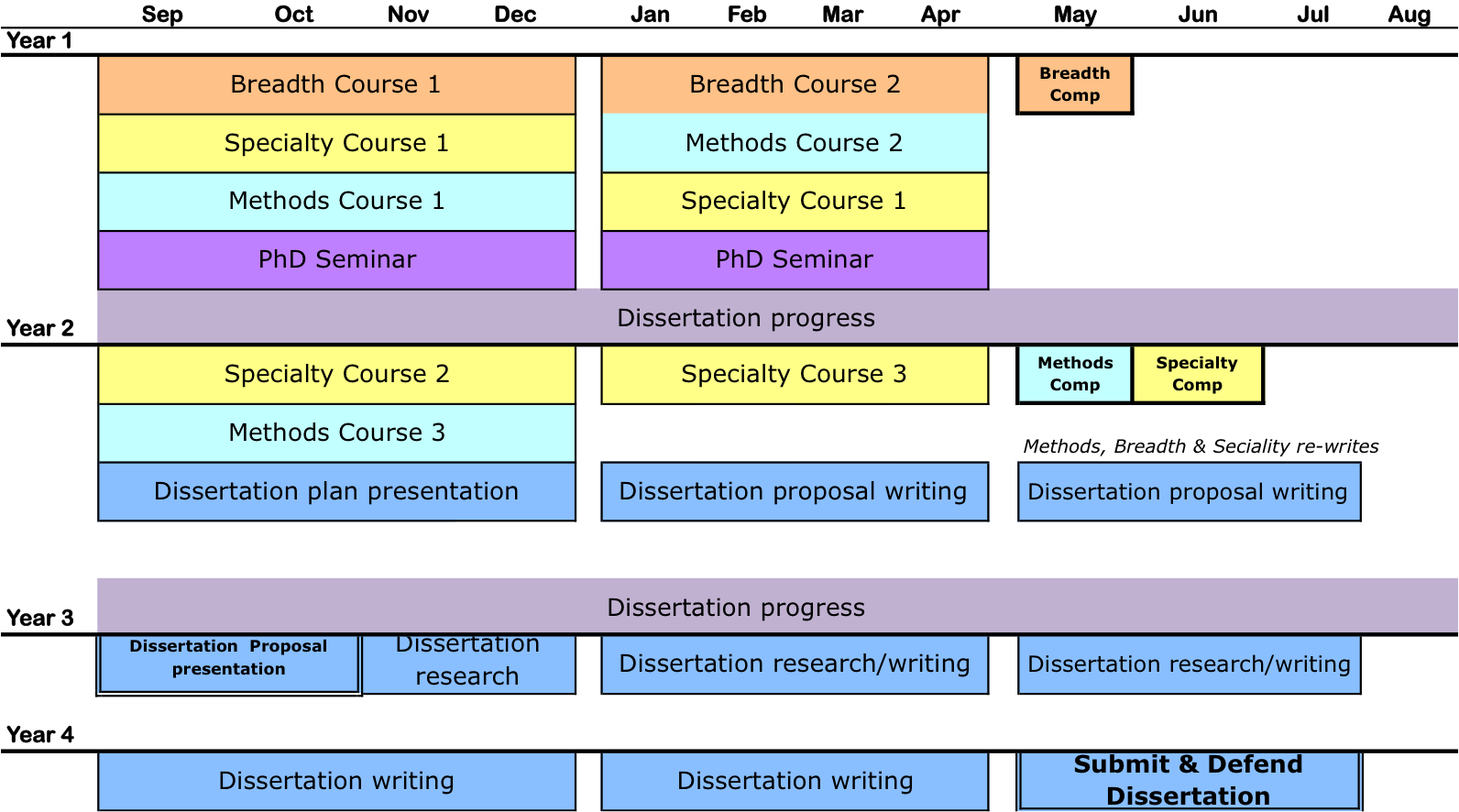Courses
Coursework is normally completed during the first and second years of full-time study. Between 4-10 half courses are required. Courses are chosen from the list of recommended courses for each curriculum area.
Required courses include:
- Two terms (half-courses) of the Doctoral Seminar in Health Policy;
- Two-three specialty field courses in a single field (health economics, political studies or health systems & society);
- Up to two breadth field courses outside the student’s specialty field, one in each of the two fields; and,
- Up to three methodology courses, including both quantitative and qualitative or mixed methods.
Students without prior graduate training in a given area are required to take the maximum number of required courses for that area. Students who have completed relevant graduate courses prior to admission may have had selected course requirements waived at the time of admission to the Health Policy PhD program. A minimum of four half-courses (two doctoral seminar courses, two specialty field courses) may not be waived and must be taken while the student is enrolled in the Health Policy PhD program.
The specific courses offered each year varies. Please see the course list for the 2023-2024 academic year (PDF) for more information.
Timelines and Milestones
Students typically complete the PhD program in four (full-time) years. Below is an overview of the timelines and major milestones of the program.
Note: This is a summary of basic milestones for completing the PhD program. This is for reference only.
Sample Curriculum timeline
Expandable List
- A three-member supervisory committee is selected and in place, preferably by the sixth month
- Course Work:
- A “course planning rubric” has been completed and filed with the program
- All courses are scheduled for completion by the 24th month (end of second year)
- Student is enrolled in a full course load (until required courses are completed)
- If required, a graduate statistics course is scheduled for completion in first year
- All course grades are B or higher; no “incompletes” outstanding; no failed courses
- Student has applied for all financial awards for which he/she is eligible to apply
- Professional activities are pursued appropriately and do not impede academic progress
- A promising dissertation topic and questions/objectives have been identified
- All comprehensive exams must be complete by 24th month (end of second year) allowing time for retakes
- The program’s professional development and competency tracking tool has been reviewed and relevant professional development goals and skill-building priorities and opportunities have been identified
- Course work:
- A “course planning rubric” has been updated and filed with the program
- All courses are being completed and passed on schedule
- All required courses to be completed and passed by the 24th month (end of this year)
- Student is enrolled in a full course load (until required courses are completed)
- All final course marks are B or higher; no “incompletes” outstanding; no failed courses
- Comprehensive exams:
- Comprehensive exams are being scheduled, written and passed on schedule
- All comprehensive exams to be completed and passed by 24th month (end of this year)
- Dissertation:
- A final dissertation topic and questions/objectives are committed to, formally presented and approved
- Design and methods for desertion research are developed and the drafting of a protocol is underway
- Student has applied for all financial awards for which he/she is eligible to apply
- Professional activities are pursued appropriately and do not impede academic progress
- Student continues to reflect on and identify career and professional development goals and opportunities in consultation with their supervisor and committee members
- Course work:
- All final courses and comprehensive exams were completed and passed by the end of 24th month
- All final course marks were B or higher; no “incompletes” outstanding; no failed courses
- A final, fully completed “course planning rubric” is filed with the program
- Dissertation:
- Dissertation proposal is formally presented in the fall of year three
- Final dissertation plans are detailed and judged acceptable and viable by faculty
- All resources necessary for completing dissertation research are secured
- All approvals (e.g., REB) necessary for completing dissertation research are secured
- Student has submitted a realistic and acceptable timeline for completing dissertation
- Student and faculty have agreed on a process for reviewing work in progress
- Substantial progress is being made on the dissertation research
- Student has applied for all financial rewards for which he/she is eligible to apply
- Professional activities are pursued appropriately and do not impeded academic progress
- Student identifies remaining skill and competency gaps and sets relevant professional development and career planning priorities in consultation with their supervisor and committee members
- Dissertation
- Substantial progress is being made on the dissertation research and writing
- Timeline for completion is kept up-to-date and is followed
- Student is completing draft chapters on a routine and non-urgent basis
- Faculty are receiving and reviewing draft chapters on a routine and non-urgent basis
- Student is completing revisions and final chapters on a routine and non-urgent basis
- Faculty are receiving and approving final chapters on a routine and non-urgent basis
- Professional activities are pursued appropriately and do not impede academic progress
- Post-graduate career strategies and opportunities are being discussed and pursued
- If fourth year completion becomes unlikely, timely plans are made for late completion, including arrangements for extended supervision and financial support
- Student is actively engaged in career planning activities

